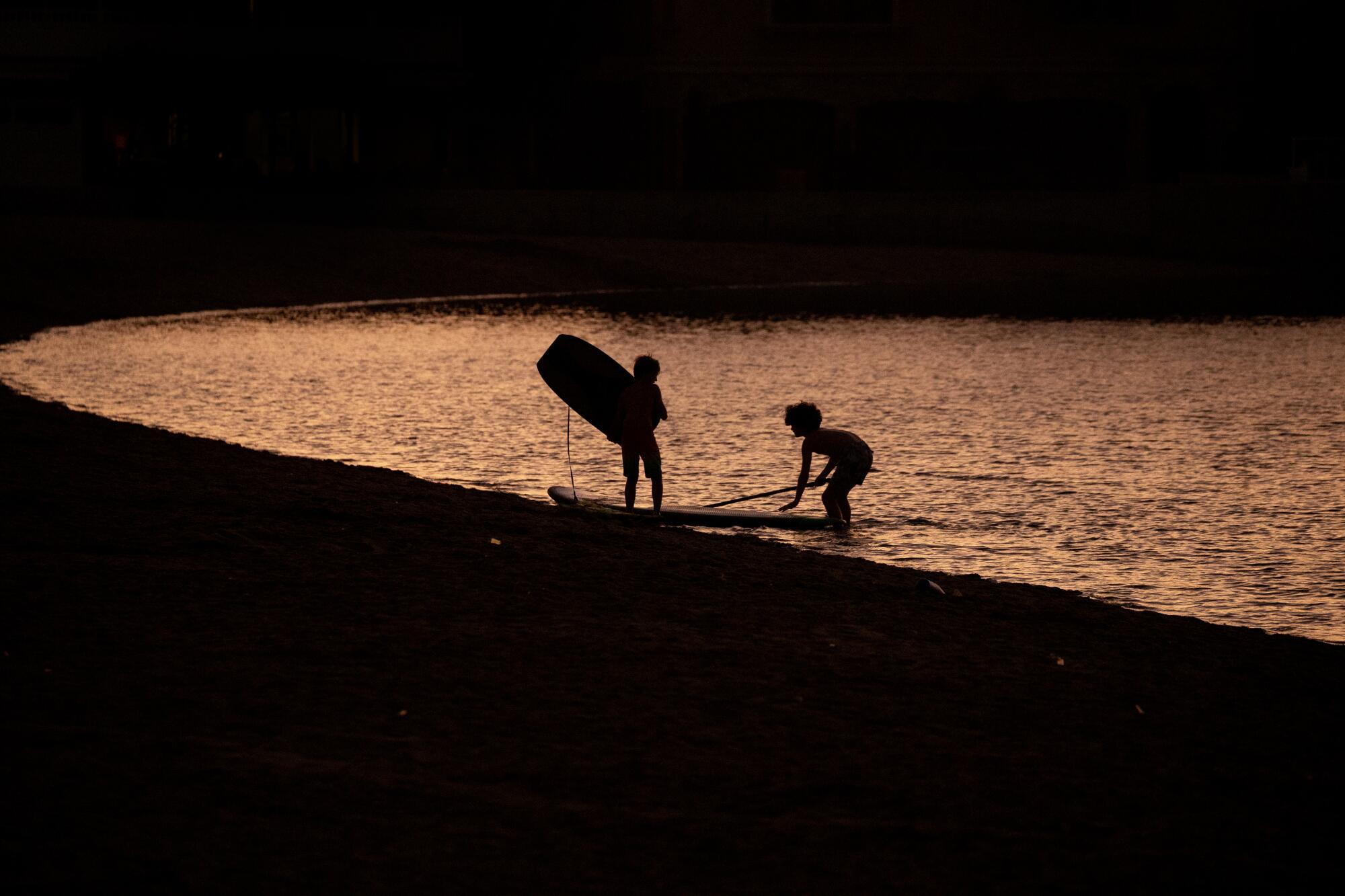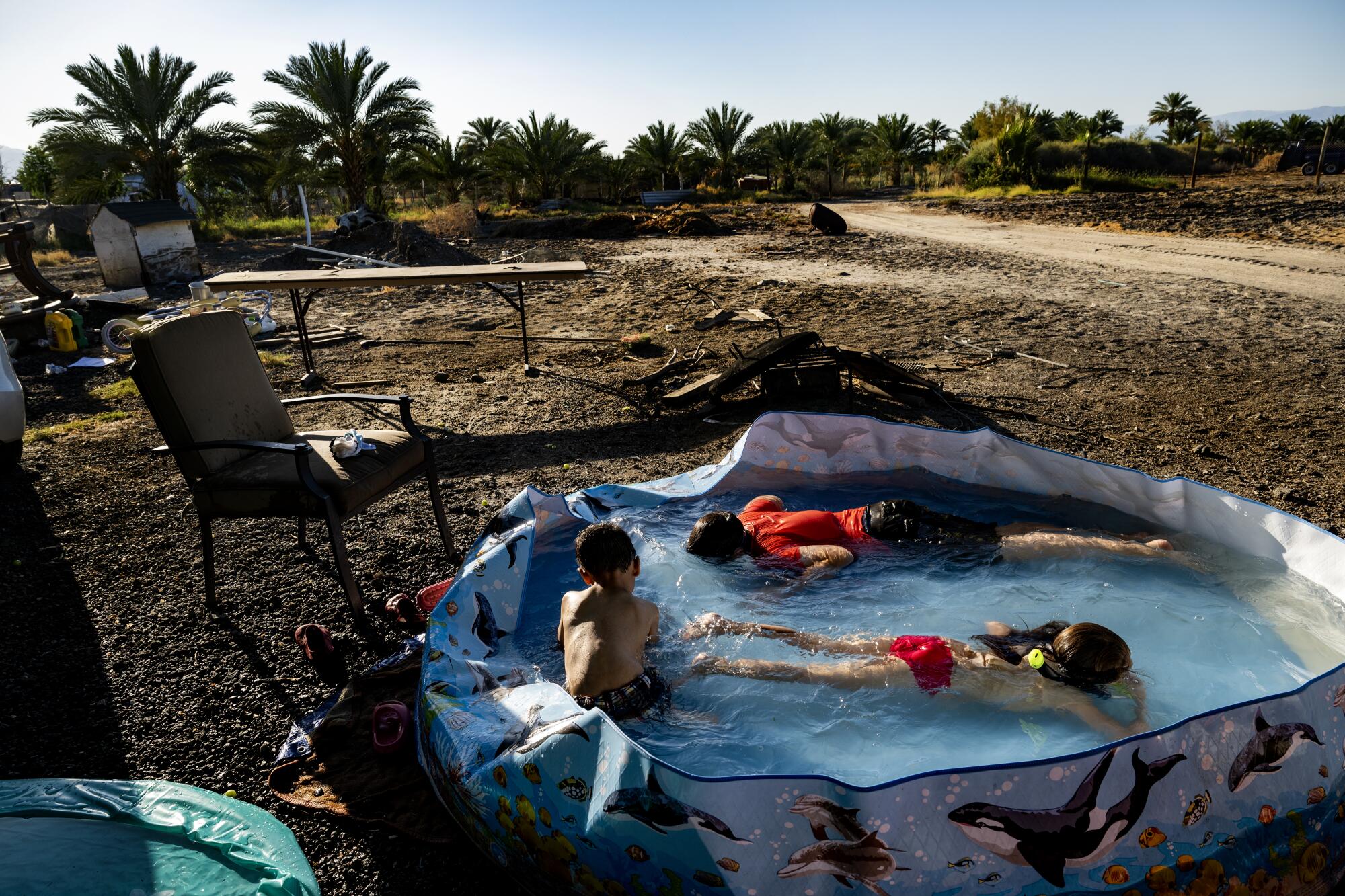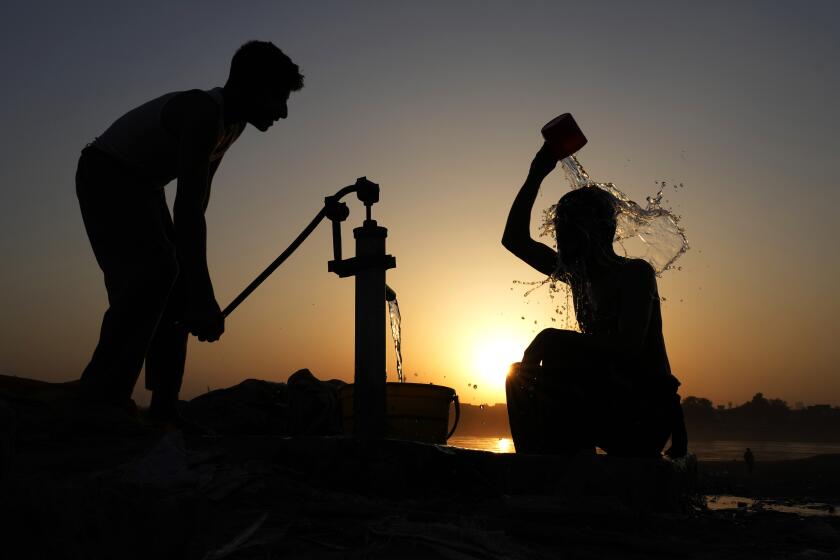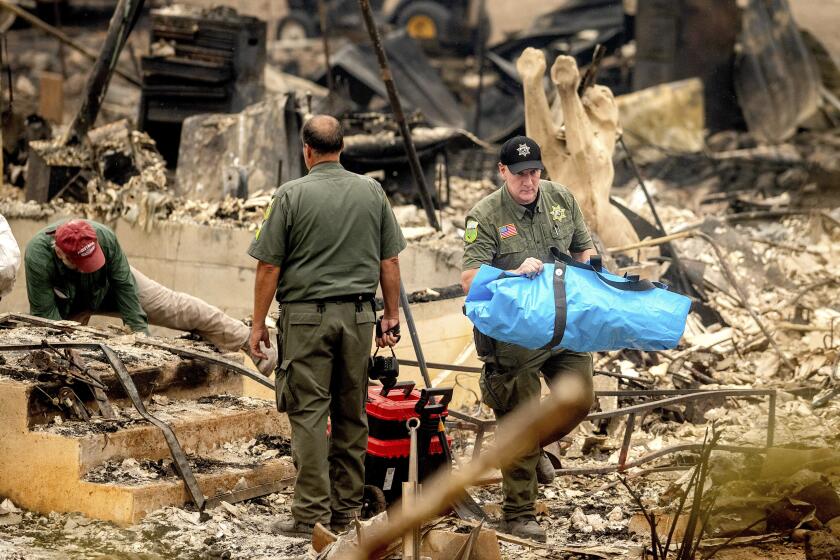
- Share via
As the planet continues its streak of record-breaking heat, the World Health Organization has issued urgent new warnings about the ways in which climate change is affecting the most vulnerable members of society at almost every stage of life.
Pregnant people, newborns, children, adolescents and seniors are all facing serious health complications from global warming, yet the needs of each group have been largely neglected, researchers argue in a series of papers published recently in the Journal of Global Health.
“These studies show clearly that climate change is not a distant health threat, and that certain populations are already paying a high price,” read a statement from Anshu Banerjee, the WHO’s director of maternal, newborn, child and adolescent health and aging. “While awareness of climate change has increased, actions to safeguard the lives of those at most risk has barely scratched the surface of what’s needed. For climate justice to be achieved, this must be urgently redressed.”
Aggressive and impactful reporting on climate change, the environment, health and science.
Among the studies is a review of the effects of climate change and air pollution on maternal and newborn health, which found links between exposure to heat and pollutants and adverse birth outcomes — particularly preterm birth. The analysis found evidence of a 16% increase in the odds of preterm birth during heat waves compared with non-heat-wave days, as well as an average increase in the odds of preterm birth for each degree of warming.
In 2019, 35.7% of global preterm births were attributable to particulate matter exposure — the equivalent of 5,870,103 newborns, the review says. Air pollution also appeared to be linked to congenital anomalies.
In fact, high temperatures and ambient air pollution were associated with a number of issues, including gestational diabetes and other hypertensive pregnancy disorders, miscarriage, stillbirth and increased risk of hospitalization for newborns and infants, among others. Lower birth weights were more commonly observed in warmer months of the year after exposure to a heat wave.
Although all people are exposed to climate change, those pregnant, infants and children are particularly susceptible to such hazards in part because of a set of “physiological, clinical, behavioral, and social factors that characterize these unique stages of life,” the study says.
For example, pregnancy increases vulnerability to vector-borne diseases, but infants and children are prone due to their immature immune systems and impaired ability to regulate body temperature. Women and children are also often at greater risk in the aftermath of disasters, particularly when access to care is disrupted.
“It is time for policy action and financing to consider the specific needs of [maternal and newborn health] in climate change hazards,” the study says.
Global average temperatures and CO₂ levels continue to soar. May was Earth’s 12th consecutive hottest month on record, officials announced this week.
But pregnancy and birth aren’t the only stages of life affected by climate change.
Another study in the package found consistent evidence that climate-related hazards and events are associated with greater negative outcomes for children and adolescents — including increases in post-traumatic stress and other mental health disorders; increases in asthma, respiratory illnesses and vector-borne diseases; increases in malnutrition and reduced growth; and disruptions to caregiving and family functioning.
“The world’s changing climate affects the fundamental rights of children to survive, thrive and reach their full potential,” the paper says. “Exposure to climate change-related events during childhood can have long-lasting effects throughout the lifetime.”

In fact, the United Nations Children’s Fund, or UNICEF, has found that half of the world’s children are at extremely high risk of climate change effects due to exposure to multiple hazards, as well as a lack of access to essential health and other services to help mitigate and recover from climate-related events. More than a third of people displaced internationally in 2022 due to climate change were children.
The WHO review focused primarily on extreme weather-related disasters and rising temperatures. It found a wide range of PTSD outcomes for children and adolescents in the wake of such disasters, as well as elevated rates of phobias, sleep disruption, attachment disorders, depression, panic and anxiety.
It also looked at the growing trend of eco-anxiety — or grief, stress, fear, anger and other emotions that arise in response to an awareness of climate change. Though it found some associations, it concluded that there remains a relative lack of data on the prevalence and severity of those mental health effects, and urged more research into the matter.
“Much remains unknown about the causal pathways linking climate-change-related events and mental and physical health, responsive relationships and connectedness, nutrition, and learning in children and adolescents,” review authors wrote. “This evidence is urgently needed so that adverse health and other impacts from climate change can be prevented or minimized through well-timed and appropriate action.”
The review also uncovered the ways in which families can be disrupted by climate change, including ripple effects on children and teens. Added stressors on parents and caregivers can affect their ability to provide care, while climate disasters can also compromise social support structures such as religious organizations and community groups.
In one example, low-income mothers in the New Orleans area were found to have higher levels of depressed moods after Hurricane Katrina, which was linked to less effective parenting, the study says.
“These findings suggest that responsive caregiving, connectedness and caregiver mental health are central factors in child health and well-being outcomes post-disaster.”
Extreme heat will strain power grids and threaten millions more Americans by 2050, a new report has found.
Seniors also can’t escape the threats of climate change, as a third assessment found that global warming is directly affecting older people’s longevity and healthy aging. Extreme temperatures, wildfire, drought, flooding, storms, sea level rise, air quality issues, infectious diseases, food and water insecurities, migration, relocation, and health and social care system displacement are all pathways to such effects.
For instance, an assessment of floods across 761 global communities found higher mortality risks in areas with larger proportions of older people. Meanwhile, 71% of fatalities during Hurricane Katrina were older people, despite seniors representing only 15% of the population.
Similarly skewed numbers have also been observed in California. All four people who died in 2022’s McKinney fire were over age 70. The majority of the 85 people who died in the 2018 Camp fire were older than 65. The study notes that older people may need more time to evacuate and more support in the case of power shortages and may be more vulnerable to particulate matter from wildfire smoke.

As in the case of children, older people also have a harder time regulating their body temperature and recognizing temperature changes, and so are particularly vulnerable to extreme heat, which is getting worse due to climate change. Not only does extreme heat expose this group to greater risks of heart failure, heatstroke, dehydration, kidney and renal issues and worsened respiratory health, but it can also exacerbate preexisting medical conditions such as cardiovascular disease, diabetes and asthma, the study says.
“Despite this, as a group, older persons have often been neglected in studies on the impact of climate change. This is a major oversight for older persons living in all regions and countries,” the study authors wrote, noting that the proportion of older people is increasing globally, with 1 in every 6 people projected to be 60 or older by 2030.
“There is a crucial need to harmonize the concerns of older individuals and environmental sustainability to safeguard the rights of older people, particularly given the escalating impacts of the climate change crisis,” it says.
All four deaths in the McKinney fire highlight how older people are more vulnerable to wildfires and more likely to live where they are commonplace.
The WHO’s findings come as international climate officials issue urgent warnings that humanity is moving in the wrong direction. May marked the 12th consecutive month of record-breaking global temperatures, and yet planet-warming carbon dioxide emissions continue to climb.
“Like the meteor that wiped out the dinosaurs, we are having an outsized impact,” United Nations Secretary-General António Guterres said during a speech Wednesday. “In the case of climate, we are not the dinosaurs — we are the meteor. We are not only in danger — we are the danger. But we are also the solution.”
Indeed, a fourth report from the WHO concludes that comprehensive action is needed.
“The effects of climate change can either be exacerbated by existing inequalities and the interaction with other crises or be mitigated through good governance, which draws on collective intelligence for the common good, evidence-based policies, the engagement of people, and the involvement of all sectors,” the report says.
The report outlines opportunities for adaptation, including infrastructure upgrades, expanded workforce capacities and the need to address the root sources of planet-warming emissions.
At the same time, the health agency warned that frameworks for maternal care and child care, as well as elder care, have received minimum attention and must be taken into account.
“A healthy environment underpins health throughout life, enabling healthy growth and development in childhood and adolescence, healthy pregnancies and healthy aging,” read a statement from WHO scientist Anayda Portela. “There is an urgent need to mitigate climate change by reducing greenhouse gas emissions and to build climate resilience; to take specific actions that protect health at these various life stages, and to ensure continuity of health services for those most at risk when climate disasters occur.”
Toward a more sustainable California
Get Boiling Point, our newsletter exploring climate change, energy and the environment, and become part of the conversation — and the solution.
You may occasionally receive promotional content from the Los Angeles Times.








